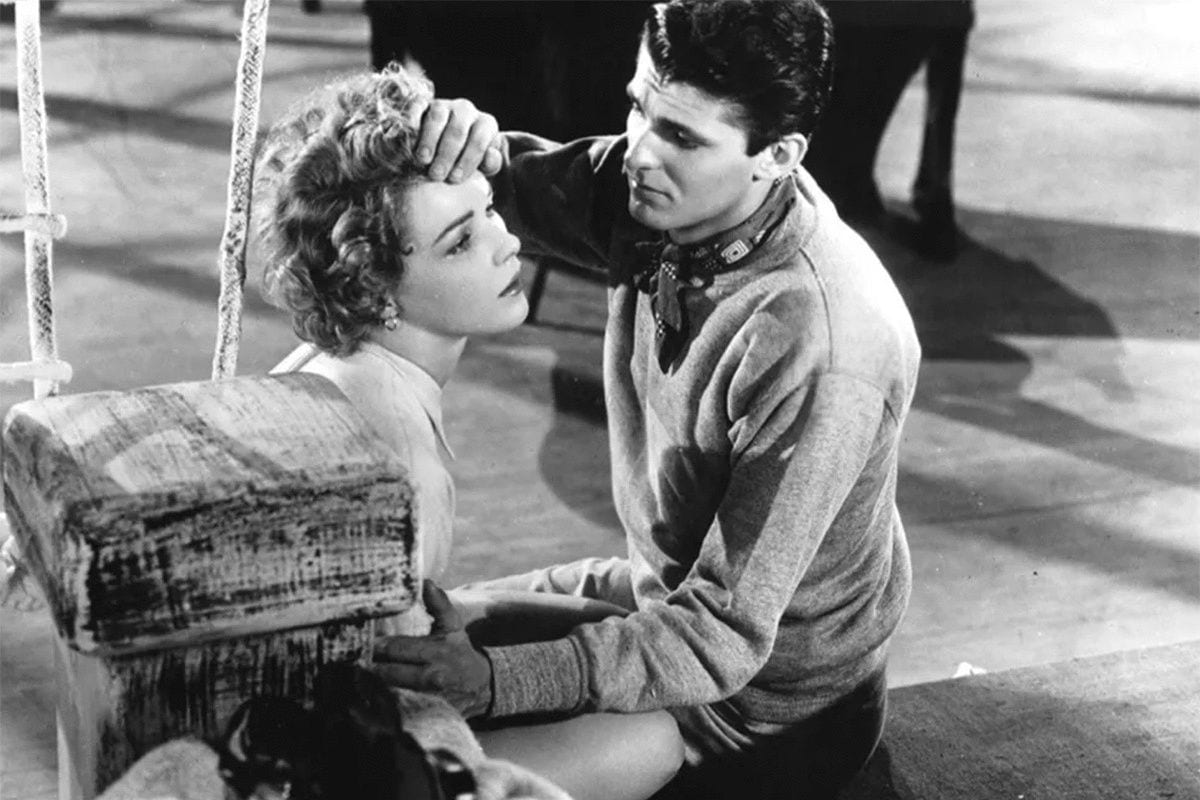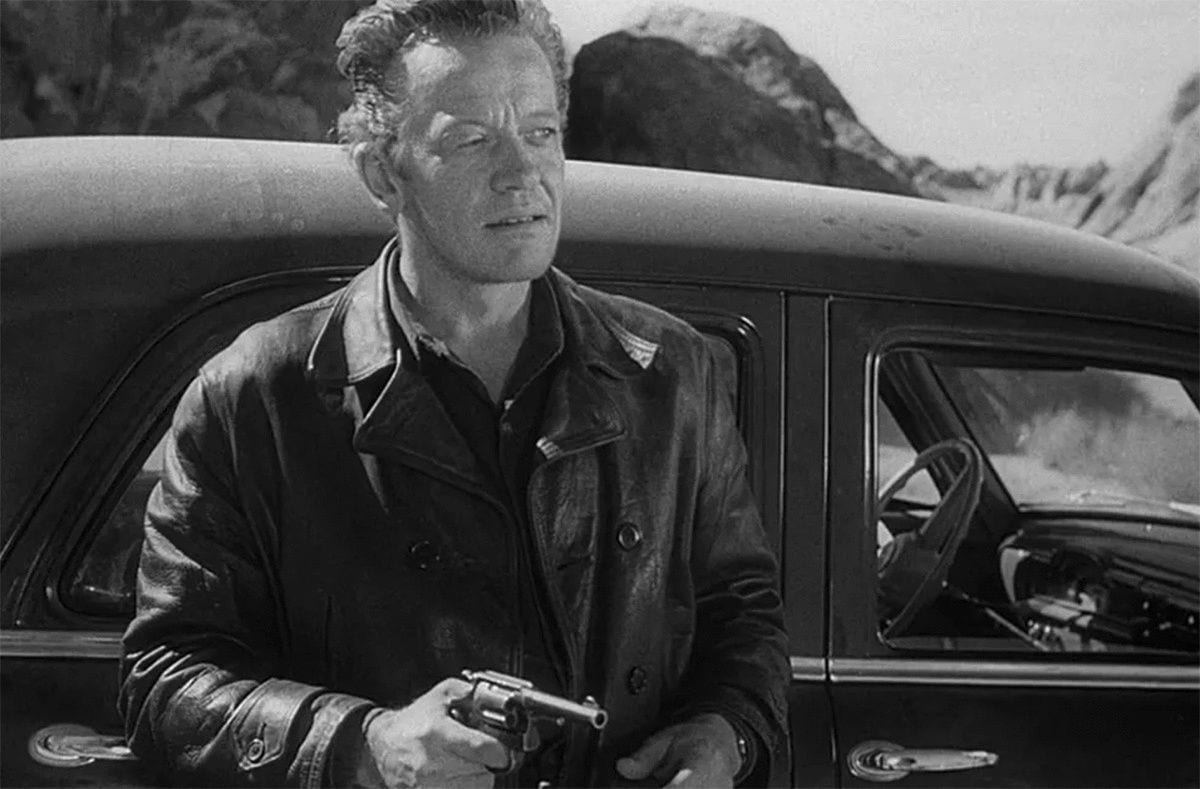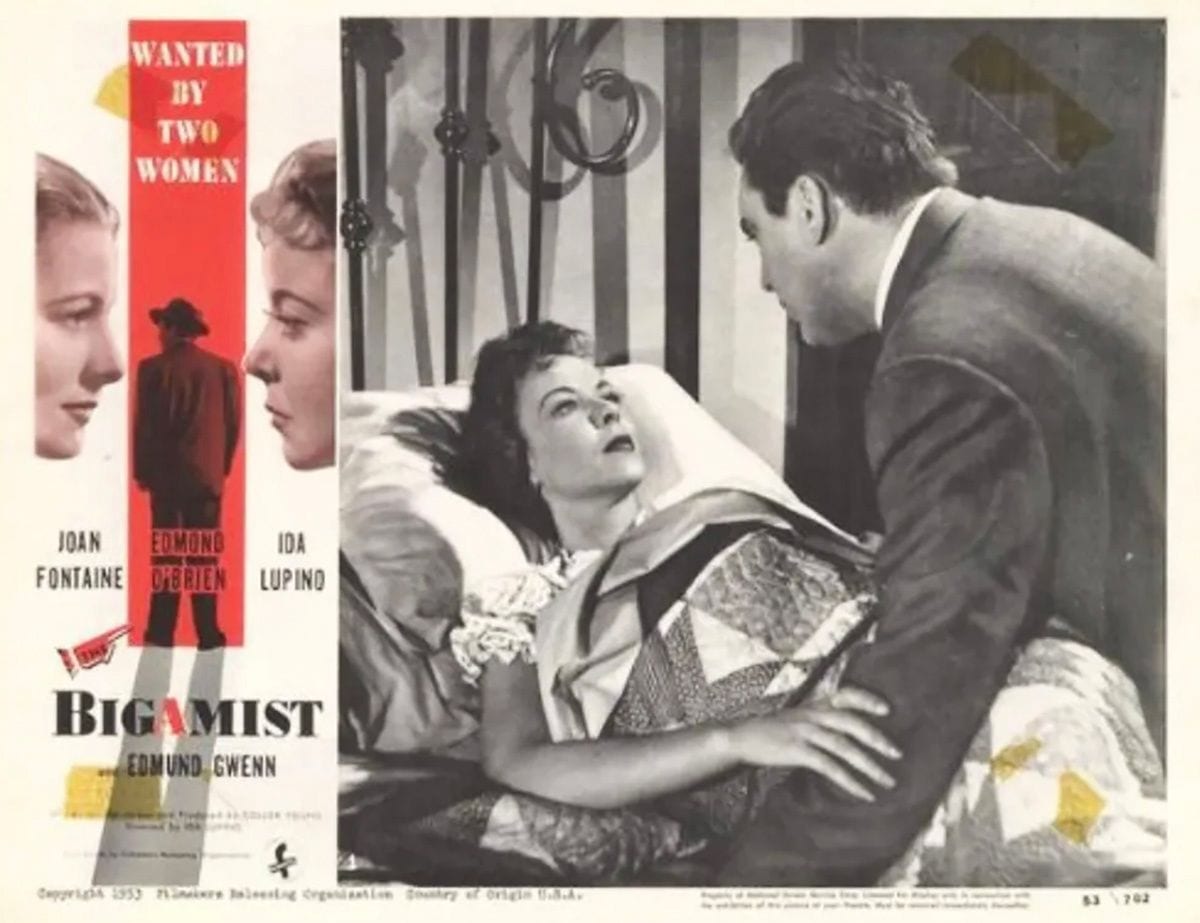
A dirge-like tempo plays as the camera angles down a steep street. At a distance, the figure of a woman trudges up the sidewalk, hands in pocket, expressionless. She nears us in close-up with a distinct look off-screen as if haunted by some invisible trauma. This image from the opening of Not Wanted (1949) encapsulates the condition all of Ida Lupino’s protagonists find themselves confronting: life was going along fine until some unforeseen event sideswiped their momentum and sent them reeling off the rails into an orbit far from their expectations. The world, as the framing of this shot suggests, tilts against them.
From 1949 until 1954, Lupino directed six feature films for her independent film company, The Filmakers. Kino Lorber’s
Ida Lupino: Filmmaker Collection presents four of these films (Not Wanted, Never Fear, The Hitch-Hiker, and The Bigamist) in varying 2k and 4k transfers that draw out their crisp black-and-white cinematography. Lupino’s foray into directing was in part dictated by suddenly finding herself damaged goods and unable to land acting work during the onslaught of McCarthyism. Elmer Clifton was originally slated to direct Not Wanted. But after his heart attack, Lupino, who both co-produced and co-wrote the film, stepped into directing while not receiving credit. Uncannily, Lupino’s trajectory into directing was not unlike that of her protagonists: sudden, and without warning.
Yet unlike one of her protagonists who cannot anticipate their future, Lupino long harbored a desire to be a writer and filmmaker. By all accounts, her entrance into acting was dictated by wanting to please her father, Stanley Lupino, a well-known music hall comedian, who wanted the entire family in show business. Although she always wanted to be a writer, Lupino reflected: “I knew it would break his heart if I didn’t go into the business”. (Ally Acker,
Reel Women: Pioneers of the Cinema, 1896 to the Present. Continuum Books. 1991. 75.) But Lupino always aimed at working more behind-the-scenes than in front of the camera. When the opportunity arose, she took it.
All of the films found in this Blu-ray collection address protagonists suddenly confronted by unexpected events: an unwed mother needing to give up her baby in
Not Wanted, a female dancer struck with polio and unable to walk in Never Fear (1949), two friends who unexpectedly pick up a psychopath for a ride in The Hitch-Hiker (1953), and an unexpected pregnancy that causes a man to marry two women in The Bigamist (1953). The two earlier films cleave closely to “women’s pictures”, whereas the latter two decidedly orbit more centrally around male anxieties. But all of the films suggest that domesticity marks a deeply fraught terrain.
Water drop by qimono (Pixabay License / Pixabay
Although The Hitch-Hiker is routinely praised as one of Lupino’s best works, her early films are strong contenders both in their self-assured style and nuance into women’s lives. Never Fear, a film that promoted Lupino’s new production company The Filmakers, opens with a virtuosic unedited shot: we see a bowl of flowers in close up through a shop window. The camera trails up to a young man, Guy (Keefe Brasselle), looking at them in medium shot. He searches through his pockets to find a sole nickel, not enough to purchase them. As an employee leaves the store with a bouquet, Guy trails him and plucks one as the camera pulls back to a medium shot revealing a poetry of movement between the actors and their relation the camera. Guy rounds a pole and then walks off into the background.
Not only does the opening sequence announce a masterful filmmaker at work, but it also economically lays out core aspects of our main character. He has a troubled past with petty theft. He loves his girlfriend Carol (Sally Forrest) and has her frequently on his mind. He routinely expresses this love through the gift of flowers. When he delivers her the flower, she immediately asks: “You paid for it?” But, unlike how we might expect the film to develop with Guy’s descent back into petty crime and Carol struggling to deal with it, it instead breaks into another direction altogether. Carol contracts polio and her dancing career immediately is derailed.
These early films hold a particular nuance for female characters and the textures of their everyday lives, which has rarely been exhibited in classical Hollywood filmmaking. An amazing sequence of female desire highlights an early sequence of Not Wanted where Sally hungrily spots Steve (Leo Penn) playing his piano in the club where they work. She stares at him through a window, the light cast on her eyes as they determinedly soak him in while he plays a dramatic composition of his own. She is drawn into the room, gazing upon him as he plays. Her lust mistakes this two-bit player, who will eventually abandon her after he draws her into bed and leaves her with child, as a shared soul or at least a fast escape from the humdrum existence of country living.
But the film provides an interesting reversal from most Hollywood cinema: the man serves as spectacle for an active and lustful female gaze. This dynamic is punctuated between shots of Sally ogling over Steve, entranced and motionless, while Steve preens before her, smoothing back his hair and casting knowing glances. He knows he has her ensnared with his mournful eyes and melancholy moods that only a teenage girl could truly find enchanting.
Eve Miller, who plays a bit part as a secretary, Phyllis, in Never Fear, holds a commanding performance in the few scenes she occupies as an older, wizened, yet sexually alluring woman. We first spot her as she sits at her desk in the foreground of the frame while her boss screams at a client in his office behind her: “Friday is e-day. E is for eviction. He’s got to go. Out in the street: furniture and everything.” Guy stands before her, overhearing this exchange while waiting for an appointment with her boss. She exchanges awkward glances with Guy and tries to make small talk, all the while uncomfortably aware of the contradiction between her boss’s attitude and the name of the company, Happy Homes Real Estate.
Although this seems like a throwaway scene for humor, Miller’s acting draws the viewer into her mastery of the situation, ignoring her boss’s temper tantrum as she smoothly passes Guy a cigarette. When the boss yells to send the young man in, she flirts with Guy, “It’s safe now. Good luck.” Despite her boss’s blustering actions, Phyllis truly commands the space, providing a sense of calm among the storm.
Not surprisingly, later in the film when Guy temporarily breaks up with Carol, he finds himself with Phyllis, out of his depth and out of his league. She draws Guy back to her apartment when he learns about her divorce. Guy grips her arms and draws her to kiss him stating, “Stop talking like the voice of experience.” But her lustful look before they kiss suggests something more afoot, a sense that she knows Guy’s intentions and in part plays into his desires since they match her own.
This is not unlike how Lupino negotiated Hollywood through subterfuge: “Keeping a feminine approach is vital—men hate bossy females … Often I pretended to a cameraman to know less than I did. That way I got more cooperation” (Acker, 76). Phyllis seems a stand-in for Lupino in this scene: an older woman with her own desires, but allowing the younger buck to think he is seducing her.
Sally Forrest as Carol Williams and Keefe Brasselle as Guy Richards in Never Fear (IMDB)
After getting a little action, Phyllis calls Guy out after he admits that he “doesn’t get” her. She observes in her calm, sensual voice as Guy lies next to her on a couch: “Carol was with us tonight. Just now you thought you could forget her. But it won’t work. For you or for me.” She then encourages him to pursue Carol as well as abandon work in real estate and go back to being a choreographer.
Guy falls asleep next to her saying, “You’re nice. Real nice.” Interestingly, we get a reaction shot of Phyllis. She gently touches his lip, longingly, until closing her eyes and clasping her hand. She is resisting a forsaken desire, perhaps imagining through Guy her ex-husband and a future that never was. That feeling was only temporarily resurrected, here. She halts herself as the screen fades to black. It is precisely in these pauses of narrative action where Lupino shines by revealing desires and depth of character, particularly female ones, that the script only hints at.
This is not to claim Lupino as a feminist by any stretch of the imagination, which she repeatedly denied. Although she was the only working female filmmaker in Hollywood at the time, she often saw this in individualistic terms and not as a part of broader sexual politics. She dismissively notes about her success as a director, “I had to do something to fill up my time between contracts” (Acker, 77). One might question how much her attitude was simply self-preservation in a deeply sexist industry and how much she believed. Either way, Lupino never gave any indication of being allied with a feminist outlook.
Looking at her films now after the rise of the #metoo moment, one cannot help but bristle at some of their more decidedly sexist and overall creepy moments. Drew (Keefe Braselle), Sally’s boss and allegedly positive male character of Never Fear, repeatedly propositions her at work to go out to dinner with him. At one point he “jokingly” states, “Well, I’m the boss, and you’re liable to lose your job. But you’re such a nice girl, I’ll let it go this time.”
Ida Lupino as Phyllis Martin and Edmond O’Brien as Mr. Jordan in The Bigamist (IMDB)
Also, in Never Fear, Carol’s doctor conspires with Guy to have him take her on a weekend drive even though she expressly rejected Guy. Carol looks visibly terrified when she rolls into the office in her wheelchair to find Guy there. The doctor states: “I have a little prescription for you, Carol. Mr. Richards has asked if he can take you for a drive.” After she protests, the doctor dismissively brushes her off: “After all, I’m your doctor.” The way in which the “professional” male world — whether it be doctor or boss — conspires to run roughshod over women’s needs remains a disturbing feature of these two films.
The Bigamist, the weakest of the four films, draws such male hypocrisy and manipulation to the forefront of its narrative. Harry Graham (Edmond O’Brien) has been married to Eve (Joan Fontaine) for eight years. He is a traveling salesman and gets “lonely” on the road where he meets Phyllis (Ida Lupino), whom he subsequently knocks up and marries out of some warped obligation. Acker observantly notes how films like The Bigamist and The Hitch-Hiker “reduce the male to the same sort of dangerous, irrational force that women represented in most male-directed examples of Hollywood film noir” (75). Yet in a film like The Bigamist, the narrative bends over backwards to understand Harry’s motives. This is unlike most film noirs where the femme fatale remains an unknowable and unpredictable force.
Throughout The Bigamist, male characters reiterate their mixed feelings for Harry. An adoption representative says: “I can’t figure out my feelings towards you. I despise you and I pity you. I don’t even want to shake your hand, and yet I almost wish you luck.” A judge deciding his case remarkably opinionates: “These are decent women, Mr. Graham. You’re basically a decent man, and that’s the whole point.” The film never officially punishes by making him serve time. Instead, the judge guides the viewers: “We really don’t need man-made laws to punish him. He’ll find out that the penalty of the court is always the smallest punishment.” The backflips that the film engages in to rationalize immoral behavior is truly astounding as the representatives of the state excuse themselves from delivering upon their very duties. Clearly white, male, heteronormative desires trump any state law.
The Hitch-Hiker, to its credit, draws starkly to the forefront the psychopathic and misogynistic behavior that guides men’s fear of domesticity in the character of Emmet Myers (William Talman). Throughout the film, Myers fondles a gun in the backseat of the car as Roy (Edmund O’Brien) drives with his buddy Gilbert (Frank Lovejoy) occupying the passenger’s seat. Extreme close-ups frequently stress the beads of sweat on Myers’ face, the scar along his cheek, his disfigured right eye. It’s like Myers crawled out from under a primordial rock, and lives precariously attached to civilization. He hovers in the back seat like an unconscious and uninhibited desire that most likely fueled the two men’s fishing expedition that jettisoned their wives and made them lie about their destination.
Ida Lupino as Phyllis Martin and Edmond O’Brien as Mr. Jordan in The Bigamist (IMDB)
A harsh minimalism defines The Hitch-Hiker. Sparse dialogue accents Myers’ commands and observations: “Move.” “Keys.” “You guys are going to die. It is just a matter of time.” Their black car crawls over an expansive Western landscape that film historian Imogen Sara Smith rightly describes on the audio commentary for the film as “other-alien, other-worldly”. We frequently get a low-angled choker close-up of Roy from under the steering wheel as if it is pressing upon his throat, slowly squeezing the life out of him.
Myers assaults the men’s masculinity as he stands above them over a fire. The light menacingly plays off his face as he launches into his longest speech of the film: “You guys are soft. You know what makes you that way? You’re up to your necks in IOUs. You’re suckers. You’re scared to get out on your own. You always had it good, so you’re soft.” Civilization, femininity, and privilege collapse together in Myers’ understanding of the world.
Furthermore, he calls the men out on their own fantasy of male freedom by lying to their wives that they would stay in Arizona but then instead travelled to Mexico: “You boys ought to be ashamed of yourselves. Causing all that trouble, telling lies.” He asks them why they lied, and ventures ideas for them: “What for? Dames?” The men never answer, which leaves their unknown motives uncomfortably hovering over the film. The trajectories of their desires and Myers’ veer disturbingly close.
The first three films in the box set chronicle all the complications of domestic life. The Hitch-Hiker, as if in response, pulls out the rug from the escapist male fantasy that fleeing the domestic leads to any sort of blissful sanctuary. Instead, you end up a crumpled heap at the end of a gun on an abandoned highway with your own perverse desires brutally distilled and towering over you.
All the discs have accompanying audio commentaries. By far the most enlightening is Alexandra Heller-Nicholas for Never Fear in that she is deeply engaged in the scholarship on Lupino and most insightful in tying Never Fear to Lupino’s other films and wider contexts in general. Not Wanted has an interesting extra of a 1950s exploitation film called The Wrong Rut that integrates footage from Not Wanted as a warning against unwed motherhood with explicit footage of a childbirth and a cesarean section.
One of the collection’s serious missteps, however, is reprinting a dated essay by Ronni Scheib from 1980. The essay provides lengthy discussions about many Lupino films that are not a part of the collection and neglectfully addresses The Hitch-Hiker in two scant paragraphs. Furthermore, Scheib holds a weird beef against feminist film critics, whom she dismisses as “more concerned with statement-making than with filmmaking.” As a feminist film critic, this is an incredibly ignorant statement.
Furthermore, Scheib constantly hammers at Dorothy Arzner, the most prominent female filmmaker in Hollywood before Lupino, by claiming she produced inferior works. One suspects Scheib’s invectives against Arzner result from Arzner being championed by many feminist film critics just before Scheib wrote her essay. But her comments seem completely out of place and inappropriate by pitting the few female filmmakers against one another in a box set that should really be mainly focused on Lupino. I remain perplexed why Kino Lorber didn’t commission an essay from any one of the many current film historians working on Lupino. Any number of them could have offered much more insightful and contemporary observations.
Regardless of these limitations, the box set reveals the power of Lupino’s filmmaking skills from the start. Furthermore, they provide a more even assessment of Lupino’s ability to bring women’s concerns to the screen, while often embedding them deeply problematic sexist narratives. Lupino was both a product of her time and a challenge to it. Emblazoned on the back of her director’s chair was the phrase: “Mother of Us All …” She used this mother role on set to cajole the assistance from her male employees so they wouldn’t be threateningly reminded that at their helm stood a powerful and disciplined woman.
She also used sexist narrative tropes within her films where she could still assert the humanity of her female characters, where she could chip away at some of the conventions of the “women’s film” or other melodramatic devices to assert a slightly more realistic understanding of female desires and needs. That she ran her own filmmaking company didn’t allow her to escape the fact that she needed to distribute and exhibit her films in a very conservative environment and had to play along with some of those conventions. Her films represent a complicated dance of female autonomy and submission, of challenging some filmic tropes and embracing others. To make Lupino a sinner or saint misses the point of what it took to make films during deeply reactionary times in a studio system that was sexist to its core.





